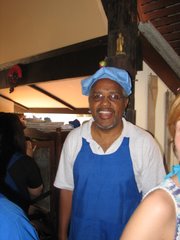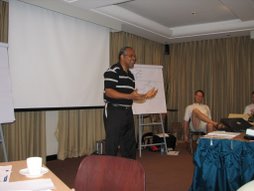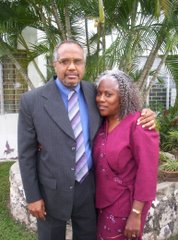Lessons from bicycle riding
I believe that life is a great teacher. If we just take the time to look at things that happen around us we can take away important lessons that we can apply to other aspects of our lives. I am fascinated by such explorations and I have the fortunate or unfortunate habit of wanting to share the findings with others.
Today is no different. I am going to invite you to join me in drawing lessons from riding a bicycle – Lessons from cycling.
The first lesson I want us to draw is the observation that being a cyclist requires personal involvement in the act of riding a bicycle. There is a famous champion cyclist who dominated cycling before my time and yours at Race Course down in Kingston Gardens. His name was Frank “Gungoo” Minott. Now if Gungoo had a son who also dominated cycling and he in turn had a son. While schoolmates might give the grandson the nickname “Cyclist”, that name will not become reality until grandson gets up on a bike and rides it.
Being a true cyclist is not something that is inherited. It is not something that is conferred on you as some honour. Even if grandson joined a cycling club and attended all their functions he would not be a genuine cyclist until he rides one himself.
Well, of what relevance is that to us in the spiritual realm?
Christianity is like cycling. Being a Christian is not something that can be inherited. It is not something that is conferred upon us as a special honour. It does not rub off by mere association. We have to take action on a personal basis to become a Christian.
There might be one here today that has never made the personal move to ride the Christian bicycle. You might have had a family that are Christians. You might have many friends who are Christians. You might have visited congregations of Christians and might even consider yourself to be a good person.
If that is your state this morning, you need to consider the following thoughts. We will be happy to explore them more fully with you than time allows me to do now:
God made man and planned that man would live eternally (Gen 1:27;2:17). Man disobeyed God in an act that is called sin. Sin separates us from God and makes it impossible for us to share eternity with God. We have all sinned and face God’s judgement. God in a supreme act of love decided to give man a chance to avoid eternal condemnation. This was achieved by having his Son Jesus Christ die for our sins. Jesus rose from the dead so that we too might have victory over the grave. (Rom 3 and 6). To do so, having heard what I just said, you must believe that there is an escape from being lost in sin.
You must decide that you will no longer remain in your sinful state. You should be ready to make it known publicly that you are going to make Jesus Christ the Lord of your life. You must then submit to baptism for the remission of your sins and commit to living in accordance with the doctrine that is set out for us in the New Testament.
Whatever you do, please take steps to get right with your maker today. Too many people want to get the best of both worlds. There is nothing in the world that is worth a fraction of your soul. Protect it now before it is eternally too late.
Rom 6: 19
19 I put this in human terms because you are weak in your natural selves. Just as you used to offer the parts of your body in slavery to impurity and to ever-increasing wickedness, so now offer them in slavery to righteousness leading to holiness. 20 When you were slaves to sin, you were free from the control of righteousness. 21 What benefit did you reap at that time from the things you are now ashamed of? Those things result in death! 22 But now that you have been set free from sin and have become slaves to God, the benefit you reap leads to holiness, and the result is eternal life. 23 For the wages of sin is death, but the gift of God is eternal life in Christ Jesus our Lord.
There is a secondary point from this first lesson:
Spiritual growth and development is also a personal matter. If 4 generations in your family were able to recite the entire Bible backwards, your personal development will be stunted unless you study and expose yourself to Bible study personally.
The second lesson we want to draw from cycling is the recognition that if I want to commit and stay committed to cycling I must come to identify some lasting value in cycling. I must find some intrinsic – some core - value that will stand the test of time. I might get attracted to the activity for a variety of reasons but unless I am able to extract something of special significance and lasting value, I might not be able to remain committed for the long haul. I might bask in Daddy’s legacy and enjoy the time I spend with club members but unless and until I find some personal connection that is lasting and real, there is no guarantee that I will not simply slip away when conditions change.
Of what relevance is that to us in the spiritual realm?
Christianity is something that is a long term project. We make a commitment to be Christians forever. That kind of commitment requires strong backing. It cannot be based on what others are doing or what is fashionable at a particular point in time. We have to find a personal anchor for our own life as a Christian. If we do not find some special intrinsic value for ourselves we stand a great chance of losing our way.
This lesson goes beyond just the spiritual realm. Whenever we make long term commitments we had better be sure that there is something special and lasting there to make us want to honour our promises and commitments. Marriage is one such area.
What is it that you use to anchor your life as a Christian? What is it that gives you the confidence that you could withstand difficult challenges that shake you to the core?
Is Christianity going to be a source of annoyance to you when your circumstances change for the worse? Is Christianity your solution of first choice? Is it your answer to every problem?
Matt 13: 44 -45
44 “The kingdom of heaven is like treasure hidden in a field. When a man found it, he hid it again, and then in his joy went and sold all he had and bought that field.
45 “Again, the kingdom of heaven is like a merchant looking for fine pearls. 46 When he found one of great value, he went away and sold everything he had and bought it.
The third lesson explores the observation that the essential secret of being able to ride the bicycle is the concept of balance.
Balance in this context should be understood in the context of something in relation to an objective standard. When it matches that standard it is in balance.
By placing a valid one kilo weight on one end of a balance one can identify when a variety of other items weigh one kilo. The kilo weight is the objective standard.
The objective standard in cycling is that the rider should be perpendicular to the ground. If that relationship is maintained they could ride forever without ever falling.
The further one moves away from the objective standard and the longer that situation prevails the more likely and imminent the fall.
What is the relevance of this for us in the spiritual realm?
We have been provided with an objective standard for how we ought to live our lives. Christ demonstrated the model through His Life and teachings. We need to examine ourselves and take care that we are not off balance.
If we find ourselves in a state in which we are off balance we must like the cyclist take quick action to restore balance or face the risk of falling.
Gal 5:19
19 The acts of the sinful nature are obvious: sexual immorality, impurity and debauchery; 20 idolatry and witchcraft; hatred, discord, jealousy, fits of rage, selfish ambition, dissensions, factions 21 and envy; drunkenness, orgies, and the like. I warn you, as I did before, that those who live like this will not inherit the kingdom of God.
22 But the fruit of the Spirit is love, joy, peace, patience, kindness, goodness, faithfulness, 23 gentleness and self-control. Against such things there is no law. 24 Those who belong to Christ Jesus have crucified the sinful nature with its passions and desires. 25 Since we live by the Spirit, let us keep in step with the Spirit. 26 Let us not become conceited, provoking and envying each other.
That leads us to our fourth lesson. It brings with it the realization that spills and bruises are an integral part of cycling.
The essential difference between people who persevere with the cycling and those who gave up while learning to ride is that one set got back on the bicycle after falling down and the other set quit.
What is the relevance of this for us in the spiritual realm?
We have to keep in the forefront of our minds that Christianity does not guarantee comfort. Christians must expect to find themselves in unpleasant circumstances from time to time. That comes with the territory and should be taken in stride. The cyclist who climbs back onto the bicycle after a fall is more concerned about the overall cycling experience than on his weeping wounds and aching body. THIS TOO WILL PASS!
Consider Paul, the highly respected Apostle. He was roundly criticized by some members of the Corinthian Church about things that would cause a lesser person to walk and talk to themselves. Even His status as an Apostle was questioned. Paul’s response to the challenge is instructive for us as to how we ought to deal with challenging situations. We should strive to be able to present with a clear conscience the responses that Paul gave. Look for example at:
2 Cor 6:1 – 13
6 As God’s fellow workers we urge you not to receive God’s grace in vain. 2 For he says,
“In the time of my favor I heard you, and in the day of salvation I helped you.”
I tell you, now is the time of God’s favor, now is the day of salvation.
Paul’s Hardships
3 We put no stumbling block in anyone’s path, so that our ministry will not be discredited. 4 Rather, as servants of God we commend ourselves in every way: in great endurance; in troubles, hardships and distresses; 5 in beatings, imprisonments and riots; in hard work, sleepless nights and hunger; 6 in purity, understanding, patience and kindness; in the Holy Spirit and in sincere love; 7 in truthful speech and in the power of God; with weapons of righteousness in the right hand and in the left; 8 through glory and dishonor, bad report and good report; genuine, yet regarded as impostors; 9 known, yet regarded as unknown; dying, and yet we live on; beaten, and yet not killed; 10 sorrowful, yet always rejoicing; poor, yet making many rich; having nothing, and yet possessing everything.
11 We have spoken freely to you, Corinthians, and opened wide our hearts to you. 12 We are not withholding our affection from you, but you are withholding yours from us. 13 As a fair exchange—I speak as to my children—open wide your hearts also.
Many of the spills and bruises that take place in life come from inter-personal relations. We cause each other a lot of pain and suffering. We could dramatically reduce this pain and suffering by adopting principles from Paul’s letter to the Corinthians.
Three critical questions should underpin how we relate to others in any and every situation:
1. Have I spoken freely to the other party?
2. Have I opened wide my heart to the other party?
3. Have I withheld my affection from the other party?
That is the objective standard that we must bring to bear in our relations with others.
Of major importance, is the need for us to use those questions as our guide when we observe or find ourselves being asked to comment on relations among others.
Instead of seeking to take sides, we should objectively walk the individuals involved through the 3-step questioning process:
1. Have you spoken freely to the other party about this?
2. Have you opened wide your heart to the other party?
3. Have you withheld your affection from the other party?
There is usually no need for you to set up yourself as judge and jury. Every single one of us needs to see ourselves as stepping stones and not stumbling blocks.
I promise you today that if as an individual you use the 3-step yardstick as the measure of your relationship with others, you will attain eternal joy and happiness.
I promise you this morning that if as a congregation we can truly use the 3-step process in our dealings with each other, there will be no limit to what we can achieve in Christ.
Our fifth and final lesson unearths the reality that cycling is about moving from one point to another and to get there we need to be focused.
Safe and successful cycling must be based on the principles of shutting out distractions on the one hand and keeping one’s eye on the goal on the other.
What is the relevance of this for us in the spiritual realm?
The road of life is full of distractions. They come in so many varieties that sometimes it is hard to identify them. But they are there. They slow our forward progress and may even take us off course.
We have to be vigilant to shut the distractions out of our lives and to keep our eyes on the goal. The focus on the goal is paramount. When that is in place even when major obstacles are placed before us we still insist on moving towards our goal. Nothing will stop from getting there and from helping others to do the same.
Phil 3:13
13 Brothers, I do not consider myself yet to have taken hold of it. But one thing I do: Forgetting what is behind and straining toward what is ahead, 14 I press on toward the goal to win the prize for which God has called me heavenward in Christ Jesus.
15 All of us who are mature should take such a view of things. And if on some point you think differently, that too God will make clear to you. 16 Only let us live up to what we have already attained.
Brethren, you cannot be a Christian by looking on or by association. It is a very personal experience. YOU have to take personal action.
I am saying that finding something about being a Christian that inspires us personally and responding to it is a wonderful idea. That is what will keep you faithful and stop you from backsliding. Cyclists usually join a club or ride with friends….that helps them to keep going even when they might feel somewhat down. If you keep close to God’s family you too will remain faithful.
Staying faithful and claiming the prize is directly linked to staying in balance with the objective standards. The closer you stick to the standard the safer will be your Christian ride. People only fall when they stray from the objective standard that is laid out for us in the Bible.
At the same time we have to realize that even good riders have spills. The key is to get up and get back on track. Unfortunately, sometimes we are thrown off balance by the devil. We should not give up our Christian ride in frustration. God’s grace is available to restore us. Repent, ask for forgiveness, make a commitment to resist the devil and move on with your Christian ride.
Finally, keep your focus. Your goal is to spend eternity with God in Heaven. Do not let the world’s distractions pull you off course. Keep your eyes on the prize.
Currently Serving
Today's special
Sunday, 18 November 2007
Subscribe to:
Comments (Atom)





